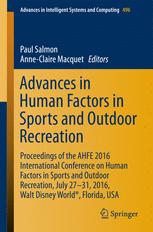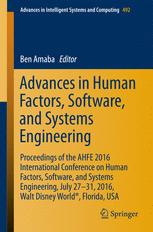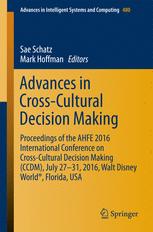Advances in Human Factors in Sports and Outdoor Recreation Proceedings of the AHFE 2016 International Conference on Human Factors in Sports and Outdoor Recreation July 27 31 2016 Walt Disney World Florida USA 1st Edition by Paul Salmon, Anne Claire Macquet 3319419534 9783319419534
$50.00 Original price was: $50.00.$25.00Current price is: $25.00.
Advances in Human Factors in Sports and Outdoor Recreation: Proceedings of the AHFE 2016 International Conference on Human Factors in Sports and Outdoor Recreation, July 27-31, 2016, Walt Disney World®, Florida, USA 1st Edition by Paul Salmon, Anne-Claire Macquet – Ebook PDF Instant Download/DeliveryISBN: 3319419534, 9783319419534
Full download Advances in Human Factors in Sports and Outdoor Recreation: Proceedings of the AHFE 2016 International Conference on Human Factors in Sports and Outdoor Recreation, July 27-31, 2016, Walt Disney World®, Florida, USA 1st Edition after payment.

Product details:
ISBN-10 : 3319419534
ISBN-13 : 9783319419534
Author: Paul Salmon, Anne-Claire Macquet
This book describes cutting-edge applications of human factors for sport and outdoor recreation disciplines and provides practical guidance on a range of methods for describing, representing, and evaluating human, team, and system performance in sports domains. Contributions in this book show how various human factors methods, applied historically in the complex safety critical domains, are suited to describing and understanding sports performance and sports injury prevention. The book discusses a wealth of methods for different purposes, such as data collection, task analysis (including cognitive task analysis), workload measurement, assessing situation awareness, performance assessment (including team performance assessment), decision making and cognition in sports, human error identification, and interface evaluation methods. With respect to other publications in human factors and ergonomics, which have been more focused on the biomechanical, physiological, environmental, and equipment-related aspects of sports performance, this book gives a special emphasis to research on analysis of individual and team sports, cognitive and social human factors, and covers both sports and outdoor recreation disciplines. Based on the AHFE 2016 International Conference on Human Factors in Sports and Outdoor Recreation, held on July 27-31, 2016, in Walt Disney World®, Florida, USA, this book provides readers with a timely survey of new methods that can be implemented during any sport or outdoor recreation event for analyzing and improving the performance and safety of both individuals and teams.
Advances in Human Factors in Sports and Outdoor Recreation: Proceedings of the AHFE 2016 International Conference on Human Factors in Sports and Outdoor Recreation, July 27-31, 2016, Walt Disney World®, Florida, USA 1st Table of contents:
Part I Decision Making and Cognition in Sports
1 Knowledge Elicitation Methods for Developing Insights into Team Cognition During Team Sports
Abstract
1 Introduction
2 Team Cognition in the Literature
3 Methods for Studying Team Cognition
3.1 Knowledge Elicitation: A Historical Perspective
3.2 A New Conceptualization of Knowledge Elicitation for Team Sports
4 Traditional Knowledge Elicitation Methods for Studying Team Cognition in Sports
4.1 Observations and Interviews
4.2 Process Tracing
4.3 Conceptual Techniques
5 Challenges of Using Knowledge Elicitation in Sport
6 New Methods of Knowledge Elicitation for Sport
7 Concluding Thoughts
References
2 A Naturalistic Neurophysiological Assessment of Photographer Cognitive State in the Vicinity of Mo
Abstract
1 Introduction
2 Method
2.1 Apparatus
2.2 Participants
2.3 Design and Procedure
2.4 Measures
3 Results
4 Discussion
5 Conclusion and Future Work
Acknowledgments
References
3 Cognitive and Application Barriers to the Use of “Agonology in Preventive and Therapeutic Dimens
Abstract
1 Introduction
2 In a Trap of the Sport Science Paradigm and the Crisis of the Olympism Ideals
3 Maximisation of Activities in Sport—The Most Problematic Justification for Sport Science and Spo
4 Limited Possibilities of Science Towards Aggressive Narrative in the Media Related to a Sports Eve
5 Conclusions
References
Part II Analysis of Individual and Team Sports
4 Analysis of Japanese Football Games by the Tracking Data and Sport Live Event Annotations
Abstract
1 Introduction
2 Research Background
3 Research Model
4 Data
5 Results
5.1 Analysis of Trajectory of Players Using Tracking Data
5.2 Word Cloud Analysis of Real Time Sport Broadcasting
5.3 The Tracking Data and Sport Live Event Annotations
6 Conclusion and Implication for Managers
Acknowledgments
References
5 Putting Together First- and Third-Person Approaches for Sport Activity Analysis: The Case of Ultra
Abstract
1 Introduction
2 Method
2.1 Participants
2.2 Data Collection
2.3 Data Coding
3 Results
3.1 The Economical Runner
3.2 The Explorer Runner
3.3 The Kairos Runner
4 Discussion
References
6 Automatic Exercise Counting and Calorie Calculation for Outdoor Exercise Equipment in the Park
Abstract
1 Introduction
2 Sensing Data from Outdoor Fitness Equipment
2.1 Counting the Number of Exercises
2.2 Automatic Calorie Calculation
3 Experiment
3.1 Experimental Setting
3.2 Exercise Data Acquisition
3.3 Experimental Results
4 Conclusion
Acknowledgments
References
7 Analysis of Tools to Measure the User Experience During the Sports Practice of Recreational Surfin
Abstract
1 Introduction
2 Methodology
3 Results
3.1 Discussion
4 Conclusion
References
8 Motivating Track and Field Athletes by Visualizing Training Drills and Records: Extraction and Vis
Abstract
1 Introduction
2 Motivation Support System
2.1 Extraction of Activities from Blog Articles
2.2 Recommendation of Blog Users
2.3 Visualization of Activities
3 The Blog Articles Written by Amateur Athletes
4 Extraction Method of Training Menus
4.1 Extraction of Training Menus from Blog Sites
4.2 Extraction of Named Entity by Using Machine Learning
5 Experiment
6 Discussion
7 Conclusion
References
9 Effect of the Functional Dynamic Warm-up on Speed, Power and Core Muscle Endurance for Adolescent
Abstract
1 Introduction
2 Research Object and Method
2.1 Subject
2.2 Experimental Method
3 Research Result and Analysis
3.1 Research Result
3.2 Analysis and Discussion
4 Conclusions and Suggestions
References
10 Empirical Analysis of Japanese Football Games Using Structural Equation Modeling
Abstract
1 Introduction
2 Research Background
3 Research Model and Hypotheses
4 Data
5 The Structural Models
5.1 Results of Hypotheses
6 Summary of Research Results from Shonan Bellmare’s Point of View and Future Study
Acknowledgments
References
11 Team Building Program for Enhancement of Collective Efficacy: The Case of a University Baseball T
Abstract
1 Introduction
2 Methods
2.1 Participants
2.2 Team Building (TB) Program
2.3 Measures (Procedure)
2.4 Analysis Procedure
3 Results
4 Discussions
5 Conclusions
6 Future Work
References
12 Analysis of an Olympic Scale of a Recurve Bow Riser on the Basis of Malaysian Under 15 and Under
Abstract
1 Introduction
2 Methods
2.1 Anthropometric Data
2.2 Load Analysis on Recurve Riser
2.3 Static Structural Analysis of the Loads
3 Results and Discussion
3.1 Load Analysis
3.2 Analysis on Recurve Riser
4 Conclusion
Acknowledgments
References
13 Simply Complex: Are LED Outdoor Activities Complex Sociotechnical Systems?
Abstract
1 Introduction
2 What Is a Complex Sociotechnical System?
3 Methods and Sources
4 Case Study
5 Analysis
6 Other Cases
7 Discussion
8 Conclusion
References
14 Research on Energy Expenditure Detection Based on Three-Dimensional Acceleration
Abstract
1 Introduction
2 Three-Dimensional Acceleration Transducer MMA 7260QT
3 MSP430F149
4 The Mechanism that Accelerometer Assess Energy of Movement
5 Hardware Design
6 Conclusion
Acknowledgments
References
Part III Health, Injury and Accidents
15 Strategy for Prevention and Control of Occupational Injuries Sports Related in a Public Utility C
Abstract
1 Introduction
2 Framework
2.1 Colombian Legislation Relating to Occupational Risk
2.2 Company Regulations
2.3 Definitions Associated with Sport and Occupational Sports Accidents
3 Sports and Accidents, Rates at EPM
4 Prevention and Control of Occupational Injuries Sports Related at EPM
5 Results of the Strategy—Conclusions
Acknowledgments
References
16 Identifying Human Factors Mismatches in Amusement Ride Containment Failure
Abstract
1 Introduction
2 Background
3 Method
4 Results
4.1 Extracted Dataset
4.2 Type of Ride Involved
4.3 Patron Characteristics
4.4 Association of Patron Characteristics and Failure Mode
4.5 Association of Patron Behavior and Failure Mode
4.6 Association of Restraint and Seating Configuration and Failure Mode
4.7 Logistic Model of Failure Mode
5 Discussion
6 Conclusions and Recommendations
References
17 Application of Functional Movement Screen to the Evaluation of Youth’s Physical Health
Abstract
1 Introduction
2 Research Object and Method
2.1 Subject
2.2 Experimental Method
3 Research Result and Analysis
3.1 Research Result
3.2 Analysis and Discussion
4 Conclusions and Suggestions
References
18 Relative Age Effect on Psychological Factors Related to Sports Participation Among Japanese Eleme
Abstract
1 Introduction
2 Method
2.1 Participants
2.2 Measurements
2.3 Ethical Consideration
2.4 Statistical Analysis
3 Results and Discussion
3.1 Demographic Information of Participants
3.2 RAE on Physical Activity Enjoyment
3.3 RAE on Physical Competence
3.4 RAE on Attitude Toward Physical Activities
3.5 RAE on Attitude Toward Physical Education
3.6 RAE on Frequency of Participation in Physical Activity
4 Conclusion
Acknowledgments
References
19 User Interface Evaluation of a Ski Injuries Management System
Abstract
1 Introduction
2 Related Work
3 User Interface Design and Interactions
4 Experimental Design
4.1 Overview
4.2 Participants
4.3 Procedure and Data Collection
5 Findings and Discussion
6 Conclusion and Future Work
People also search for Advances in Human Factors in Sports and Outdoor Recreation: Proceedings of the AHFE 2016 International Conference on Human Factors in Sports and Outdoor Recreation, July 27-31, 2016, Walt Disney World®, Florida, USA 1st:
advancements in sports
advances in sports medicine
advancements in sports technology
advances in sport and exercise psychology pdf
human factors sport
Tags: Advances, Human Factors, Sports, Outdoor Recreation, Proceedings, International Conference, Human Factors, Paul Salmon, Anne Claire Macquet
You may also like…
Cookbooks
Science (General) - International Conferences and Symposiums
Business & Economics












